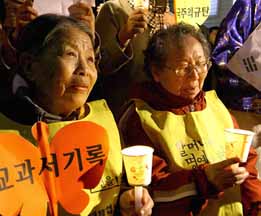How Many Times Does Japan Have To Apologize?
Q: How many times does Japan have to apologize
to satisfy you?
A: Oh ... how about once? Once is enough for me.
Burning Japanese goods at Tsinghua University, May 1919
Q: Then why are there continuous demands for
Japan to apologize again and again? Why are you never satisfied?
A: Just take a look at what happened last week. From Asahi
Shimbum:
In November last year, Japanese education minister Nariaki Nakayama said, "It is good that expressions such as 'comfort women' have decreased in history textbooks." The remark immediately came under fire, and Nakayama was forced to issue an apology several days later.
During a town meeting Saturday in Shizuoka, Nakayama said he had been speaking semantically last November about the term used for the tens of thousands of women who were forced to provide sex for Japanese soldiers during World War II. Then he said: "The word (comfort women) did not exist during the war but was being used in textbooks. So I said it was good that this incorrect expression was being removed from textbooks."
What do you think about that? Maybe you shouldn't care about what someone born after WWII like me thinks. Maybe you think that the comfort women were just a few pro-Japanese entrepreneurs? For example, the photograph below is that of a barber shop in Guangzhou that welcomes Imperial soldiers.
But will you tell these survivors in the photographs below that they and/or their experiences didn't exist? Or will you argue with the survivors that Nakayama was only concerned about the finer points of proper names and then you can debate with them about whether The Holocaust can be written in textbooks because the word did not exist while it was happening? If you tried that, you deserve to be slapped around by these women.

(Photos: Tai Kung Po and China Daily)
Will you demand yet another apology from Japan, at the least about this particular remark by this specific individual? From China Daily, the predictable outburst from South Korea:
South Korean politicians and media blasted Nakayama, who caused a stir last November by praising history textbooks that played down what he termed "excessive descriptions" of Japanese wartime wrongdoing.
"We only feel regret and rage at these senseless words that deny past aggression coming from the highest official responsible for Japan's education with no trace of remorse," Jun Byung-hun, a spokesman for South Korea's ruling Uri Party, said on Sunday.
From Xinhua, the predictable outburst from China:
China strongly condemns the remarks of a senior Japanese official denying the existence of "comfort women", said Liu Jianchao, spokesman of Chinese Foreign Ministry here Monday. Liu said it is known to all that the "comfort women" system was a serious crime committed by the Japanese militarists during World War II, and the overt denial of this ugly history by a Japanese cabinet member who is in charge of education seriously hurts the feelings of the peoples of the victim countries.
From Asahi Shimbum, the predictable subsequent apology from Japan:
Remarks by the education minister about the term "comfort women" not existing in the past brought a rebuff Monday from the government's top spokesman. Chief Cabinet Secretary Hiroyuki Hosoda said at a news conference that Nariaki Nakayama's views were not those of the government, whose stance on the issue remains unchanged.
At his news conference Monday, Hosoda said the problem was not the word itself but what really took place. "As long as there are people who existed as comfort women, the government's stance is unchanged," Hosoda said. "In the past, the government has expressed apologies and remorse in the form of a chief Cabinet secretary statement," Hosoda said. "Our position has not changed.
Once again, the world is happy and moves on ... until the next Japanese politician drops yet another bomb. And then we have to go through the same ritual again. This is what makes the Japanese situation so unique, as compared to Germany and others. Japan will have to keep apologizing as long as a very small number of Japanese politicians deliberately cause these troubles.
Why do they do it? I believe that they do this because they are trying to wear us down. If we forget to protest one time, they will have moved another inch forward. Besides, they don't seem to anything to lose when they do so because they keep their jobs.
Or do they? Mutant Frog pointed to the Daily Yomiuri report:
Following Nakayama's remark Saturday, Chief Cabinet Secretary Hiroyuki Hosoda reiterated at a press conference Monday the government's apology to comfort women, saying "Comfort women did exist, and the government has never changed its position."
"The government acknowledges that the honor and dignity of many women were damaged through their treatment. We have apologized publicly and stated our regret in official statements, such as that by a previous cabinet secretary."
A previous cabinet secretary? Is Nakayama history already? Or is it the subtlety of language again?